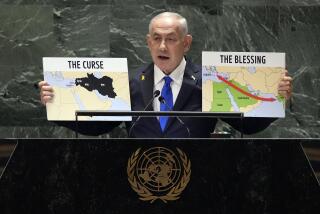UN spotlight on Mideast crises; Netanyahu blasts Iran deal
UNITED NATIONS — In an impassioned speech interspersed with bouts of dramatic silence, Israeli Prime Minister Benjamin Netanyahu on Thursday condemned the Iran nuclear deal as empowering Tehran to spread unrest in the Mideast while leaving the country capable of making an atomic bomb.
Netanyahu described Israeli-U.S. bickering over the deal as “a disagreement within the family,” and the United States also downplayed any lasting effects of the fallout over an agreement that Washington praises and Israel condemns.
The Israeli leader’s speech to world leaders at the U.N. General Assembly was notable for his rhetorical flourishes, including 47 seconds of silence about 15 minutes into his address.
Netanyahu insisted the nuclear agreement lets Iran support terrorism in the Mideast and bolsters its plan to liquidate the Jewish state. He said the U.N. and most governments have responded to Iran’s intent to destroy Israel with “deafening silence,” and then stopped speaking to emphasize his point, glowering at hushed delegates before finally resuming his speech.
Netanyahu kept attacking the accord, which has already gone into effect despite intense lobbying by Israel’s allies in Washington.
“This deal doesn’t make peace more likely,” he said. “By fueling Iran’s aggressions with billions of dollars in sanctions relief, it makes war more likely.”
After Netanyahu again denounced the Iran deal in his speech, White House spokesman Josh Earnest said President Barack Obama “is proud of the strong relationship between our two countries and the unshakeable bond when it comes to our commitment to Israel’s security.”
Iran denies any interest in nuclear weapons. It describes its atomic activities as peaceful, focused only on generating energy and advancing science and medicine. The Obama administration insists the deal is effective in crimping the activities Tehran could use in making an atomic bomb.
The constraints are in effect for 10 to 15 years, and Netanyahu argued that once they are lifted, Iran would be only “weeks away from having the fissile material for an entire arsenal of nuclear bombs.”
As he has for years, Netanyahu insisted that Israel would stop Iran from getting the bomb.
“Israel will not allow Iran to break in, to sneak in or to walk in to the nuclear weapons club,” he declared in an allusion to his country’s vow to strike at Iran militarily as a last resort.
Netanyahu listed what he said were disruptive actions by Iran even as the nuclear deal was being negotiated: shipping weapons and proxy fighters to Syria; arms to Yemen and to Hezbollah in Lebanon; sending top Iranian military officers to the divided Golan Heights region, and threatening to topple Jordan’s government.
Describing the greatest danger to the world as “the coupling of militant Islam with nuclear weapons,” Netanyahu said the Iran nuclear deal may well “prove to be the marriage certificate of that unholy union.”
“Do any of you really believe that a theocratic Iran with sharper claws and sharper fangs will be more likely to change its stripes?” he asked. “Keep Iran’s feet to the fire.”
Netanyahu invoked his first appearance at the General Assembly’s annual meeting as Israel’s U.N ambassador 31 years ago said then that he was as determined now as he was then to oppose what he described as anti-Israeli sentiment at the world body.
On Thursday, he urged his audience to “stand with Israel as we check the fanaticism at our door,” adding: “More than ever, Israel is defending you.”
The Israeli prime minister also blamed lack of progress in talks with the Palestinians on President Mahmoud Abbas, saying that Israel was ready to return to negotiations any time.
On Wednesday, Abbas told the assembly that the Palestinians should no longer be bound by agreements with Israel that were meant to form the basis for a two-state solution to the Middle East conflict. Abbas’ speech reflected growing Palestinian frustration and appeared aimed at focusing the attention of the international community — busy with the Syrian civil war and the migrants’ crisis in Europe — on the long-festering Israeli-Palestinian conflict.
Copyright 2015 The Associated Press. All rights reserved. This material may not be published, broadcast, rewritten or redistributed.
More to Read
Sign up for Essential California
The most important California stories and recommendations in your inbox every morning.
You may occasionally receive promotional content from the Los Angeles Times.










